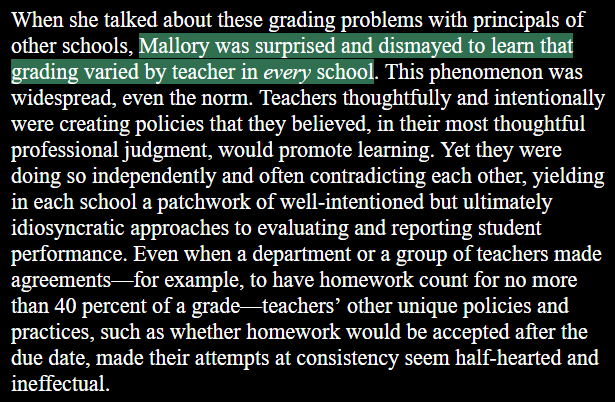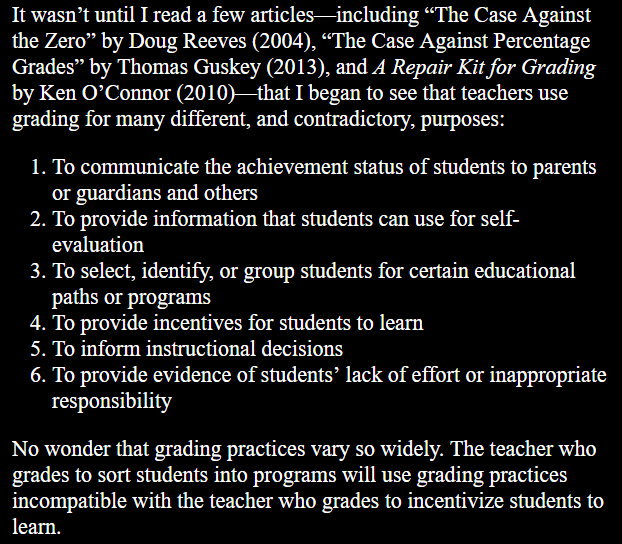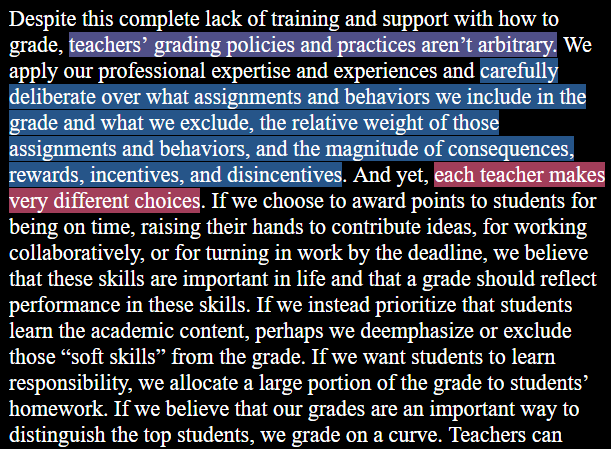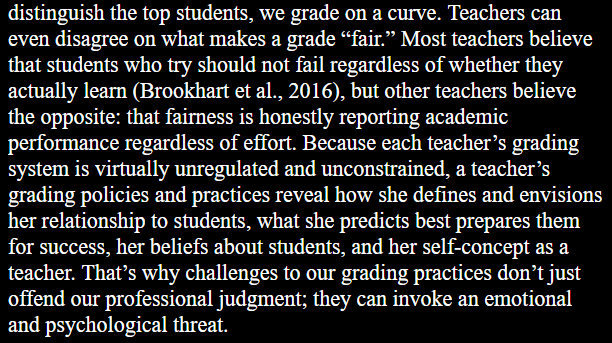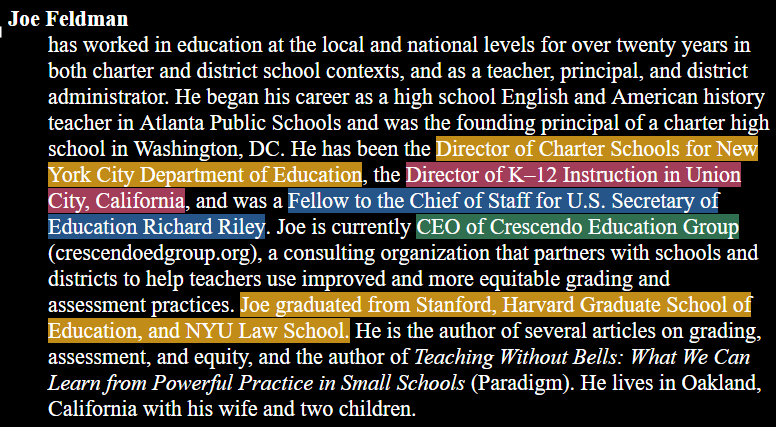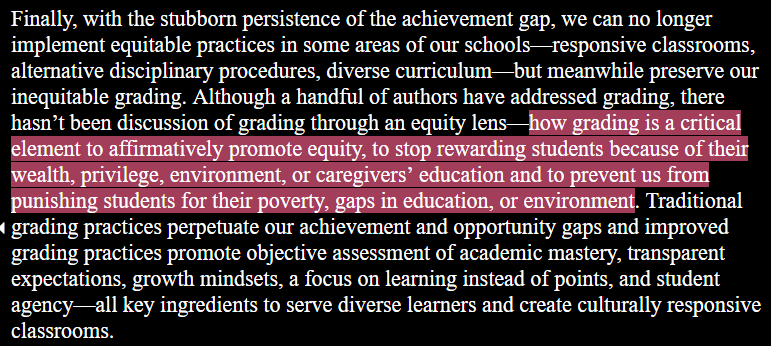Threads: 'Grading for Equity' Sucks, Chapter 1
These threads were originally posted on Twitter as live-responses to reading the book Grading for Equity by Joe Feldman. You can also read threads for chapter 2.
Thread 1: Sunday, 02 January 2022
Petition to ban former principals and administrators of schools from writing hypothetical scenarios as fact and as if they aren't responsible for establishing or changing school-wide policies.
I have read enough PD [professional development] books to see this trend, and it's such garbage.
The same applies to current principals and administrators, honestly.
Stop writing books about system-wide policy that many of you can change or refuse and then blaming teachers for its implementation. It's so disingenuous.
(In all honesty, the sentence could just finish at "stop writing books" because there are already far too many supporting and "reforming" harmful policies we should be questioning. While also blaming teachers for implementing policies they largely didn't ask for.)
Like, I'm not saying this shit isn't true, but this is the most garbage framing in a hypothetical situation about a "poor, clueless principal" who apparently had "no idea" teachers brought implicit bias to the classroom.
(From 'Grading for Equity'.)
Same book, trash framing.
Would love to see mentions of how principals and administrators have *actively encouraged* these behaviours. Because I have been in more places where that's true than these hapless admin.
What I have, as a teacher, run into more frequently has been: - teachers *trying* to find ways to consistently mark students (and often failing because we understand arbitrary systems in subjective ways); - teachers being denied time by admin to collaborate in this manner.
Like, I don't want to support schools because abolish them entirely.
But the impetus of these charter-running dweebs from Harvard (the author, Feldman, is) to attack teachers they directly impact with policies while "promoting equity?" Astounding.
Literally hate this book, and I'm still in the prologue. All of this should've started a "why do we do this?" or "the system is harmful" conversation, but he's decided to write it as "teachers are to blame for these contradictory uses."
Instead of blaming teachers, why not look at the system for treating grading as such? Why not stop to go "If this is what everyone sees grading as 'being used for', what should we do instead?"
But I guess it's easier to start from a place of assumptions that we "need" something.
Thread 2: Monday, 03 January 2022
Just want to also add to this [the previous thread] ban:
Administrators and principals who write these PD books pretending their ideas are great need to stop obscuring their positions, pretending they're teachers.
Especially because they do that to shit on teachers and create further division.
Again, in the long-term, we need to abolish schools and replace them with healthy learning communities.
But in the short-term, we need to throw all of these divisive admin dweebs in a fucking bin so they can stop pretending they're Oh So Wise about everything.
Thread 3: Monday, 03 January 2022
Here's a hint: Maybe it's because grading is a completely useless exercise that doesn't actually do anything of value and could be thrown out tomorrow with no real impact.
Goddamnit, this book sucks.
I'm basically cataloguing my frustration with this book here. I meant to read it as research, but now I just want to throw it out the window.
Someone, quick. What's the definition of 'arbitrary' again?
This dude went to fucking Harvard, was a school admin, opened a charter school... But he can't fucking recognise 'arbitrary' when he sees it.
I hate PD books so much. This is why.
Let me finish this paragraph about how grades "aren't arbitrary."
So... grading is based on a perceived relationship to students. And beliefs about students...
Which, idk, indicates... something is arbitrary?
I'm really stuck at YOU JUST DEFINED ARBITRARY. HOW IS IT NOT ARBITRARY. ALL OF THAT IS ARBITRARY.
Can we please just throw away the Education section of uni press houses until they learn what words mean and actually start critiquing themselves. I just can't.
Just to put up, this is the author of Grading for Equity.
And a fun thing to note is how close Harvard is to a lot of the major problematic elements of the US's charter school movement.
Including researching the one Zuckerberg did in Newark. Funded with his own money.
Anyway, back to reading this obtuse mess of a book that will occasionally ask a useful question but run as fast as possible towards "reform the tradition" instead of "question the system."
This is also a huge issue I have with teaching PD books.
Okay, so the book is trying to be all "sometimes the truth is hard to swallow" and "we all have webs of belief."
Yet he hasn't even tried to consider that grading itself is a problem and something to get rid of. It's so weird. (This passage is followed by Alice in Wonderland.)
Something else I hate about this book is that, when he talks shit about teachers, he likes using "we" to show that "he's one of us" (a teacher).
And then he swaps to "they" when he's talking about what teachers should do.
This is such a common rhetoric among admin, though.
I don't inherently have a problem with the issues he claims he wants to solve with "more equitable grading," but I still maintain that grading is going to perpetuate those systems regardless of how you do it.
And that there are *systemic issues* he's refusing to address.
Grading practices are going to perpetuate injustice, regardless of what we choose to do. It'll perpetuate hegemonic cultural practices, leaving out everyone else.
It'll still rank importance of skills, which are still going to be based largely in whiteness.
It's also still going to perpetuate patriarchy. It's going to continue marginalising people. Even if we do select criteria that are culturally relevant to marginalised peoples? It's still going to largely be the dominant culture *making those choices*.
Grading is Just Bad.
ALSO, it'll still uphold ableism in a lot of ways because non-disabled people often do not see the world in the same way we do.
Like. IT'S SO OBVIOUS, HOW ARE YOU MISSING THIS. (I know how he's missing it. It's rhetorical.)
There are questions to consider at the end of the chapters. This'll be fun.
Answer: They are people who deserve to be included far more than society includes them; they have every right to participate in the development of things that involve them as anyone else.
I think schools demotivate them, and I think it's largely because we silo them into spaces and force them to really only interact with people their own age (along with "approved" adults outside the family).
I think schools alienate them from society, honestly.
I think grading systems force them to pay attention to their grade more than what they could learn, but I also don't pretend that schools are for learning! Because they're most certainly not.
So abolish school!
(Yeah, I shouldn't answer all the questions he asks at the end.)
Grading is a pointless exercise, and I don't think it's worth considering. We should just throw it away.
That was much easier because the rest of the question set is irrelevant if you already disagree with the premise.
Well, I'm putting a pause on this nonsensical book for today. That was Chapter 1. The prologue is linked somewhere earlier in the thread, and I've put together a 'research' page for that's also linked earlier in the thread.
Welcome to why I try to avoid PD books.
